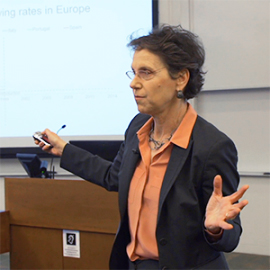
I am passionate about these courses and hope similar interdisciplinary courses are offered elsewhere. Many of the insights I gained about the financial system apply to the interaction of all corporations with society. The Corporations and Society Initiative has an educational mission in the hope of encouraging more courses as well as more engagements within other existing courses on issues at the nexus of corporations, governments and society.
Political Economy, Blind Spots, and a Challenge to Academics, 2019
How Business Schools Can Help Restore Trust in Capitalism, PDF , 2019
Beyond the Basics: Finance and Society Elective Helps Students Think About Broader Implications, 2014
The Internet Is Broken. Can It Be Fixed?, 2019
Q&A with Stanford faculty on Silicon Valley, 2019
Business and Government: Power and Engagement in the 21st-Century World, 2022
Early in my career I taught Decision Making Under Uncertainty to MBA students, Corporate Finance at multiple levels, and various PhD-level courses, particularly a new course on Information in Financial Market.
Since 2014, I have been teaching new interdisciplinary courses at the MBA and undergraduate levels, attempting to draw braodly from different schools and departments at Stanford. The initial titles were Finance and Society, but have evolved and expanded to teaching about the internet and, broadly, about Corporations and Society, with emphasis on finance but going beyond.
Business and Government: Power and Engagement in the 21st Century World
GSBGEN 593 | Fall 2021
Co-taught with Robert Siegel
Complex interactions among governments, businesses, and other institutions such as media, non-governmental, and international organizations, shape our world and our lives. In this course we will explore the workings of these interactions and the challenges they present for societies around the globe. As specific examples, we will discuss the 21st century economic and political forces affecting internet governance, global supply chains, and the workings of different legal systems.
We will see how the competence and integrity of people and institutions, their respect of human rights, and the structure and effectiveness of governance and accountability mechanisms in the private and the public sectors, are key determinants of the outcomes. At one extreme, people and institutions may be highly effective but lack concern for human rights. At the other extreme, compassionate individuals and institutions might be ineffective or incompetent. It is also a truism that power can corrupt and may be abused. In fact, standard success metrics in business and in government, combined with weak governance mechanisms, may encourage and enable such abuse. The course will challenge you to consider your own roles as business leaders and as citizens, and your opportunities to help create trustworthy institutions and markets.
Power in Finance
GSBGEN 538 | Winter 2023
Co-taught with Heiner Schulz
There is a growing sense that both capitalism and democracy are in crisis. Is the focus on financial metrics and markets to blame for the eroding trust in corporations and governments? How do power dynamics shape the financial system and determine economic and political outcomes? In this course we explore the complex interactions among individuals, corporations and governments that help answer these questions. Topics include corporate governance, financial regulation, investor power, financial innovation, and the roles of auditors, regulators, whistleblowers, courts, and the media. The course draws on multiple fields in the social sciences, but we will pay particular attention to issues around incentives, legal rights and responsibilities, and governance of all institutions. Visitors with extensive experience will enrich class discussions.
Finance, Corporations and Society
ECON 143, POLISCI 127A, PUBLPOL 143, INTLPOL 227 | Winter 2022
Both “Free market capitalism” and democracy appear to be in crisis around the world. This interdisciplinary course, which draws from the Social Sciences, Business and Law, will help you gain a deeper understanding of the root causes of these intertwined crises and will enable you to be savvier in your interactions with the institutions in the financial system and the broader private and public sectors that shape the economy and affect our lives. Topics include financial decisions, markets, and intermediaries; corporations and their governance, laws, regulations, and politics; and the role and functioning of the media. We will discuss and analyze current events and policy debates regularly throughout the course as they illustrate the key concepts. Students will have the opportunity to explore these issues through group final projects. Visitors with relevant experiences will enrich our discussion.
Is the Internet Broken?
GSBGEN 578 | Spring 2019
Co-taught with Jonathan Dotan
This interdisciplinary course examines the promise, peril, and possible future of the Internet and the impact of the World Wide Web on our lives. We will explore the most pressing contemporary issues facing the Internet, including debates on privacy, antitrust, freedom of speech, access, neutrality, and regulation. We will also unpack the claim that “decentralization,” as it has grown with new technologies such as blockchain and crypto assets, captures the original vision of the Internet. A key question we will address is: What should be the roles of markets, governments, and different stakeholders in shaping the Internet? Students will have the opportunity to reflect on their own motivations and roles as digital consumers, potential innovators, and future leaders in this process.. Guests from the tech sector and elsewhere will enrich our discussion.
Finance and Society
FIN 332 | Winter 2019
Co-taught with Heiner Schulz
This interdisciplinary course explores the economic, political, and behavioral forces that shape the financial system and, through this system, have a major impact on the economy and society. You will gain an in-depth understanding of how the complex interactions between individuals, corporations, governments, and the media can help markets work or, in turn, generate governance failures and inefficiencies. Visitors with varied experiences will enrich our discussions of key questions about the workings of capitalism in liberal democracies.